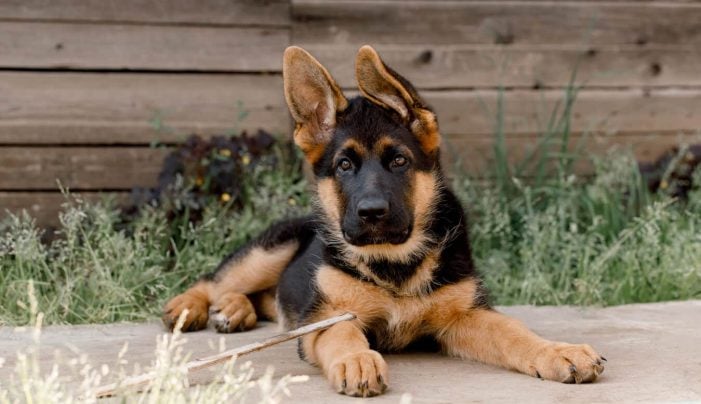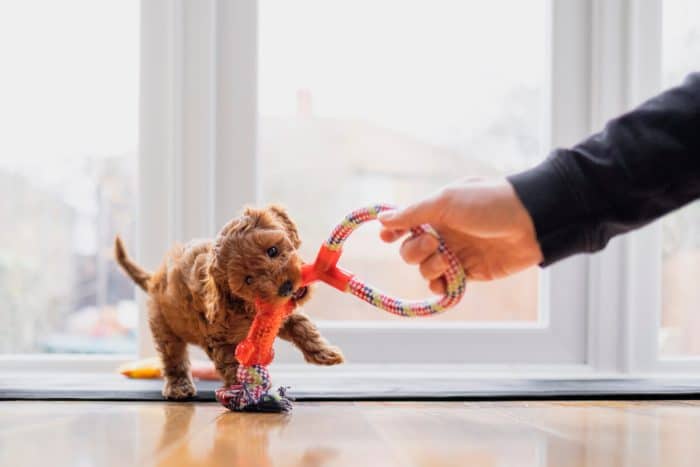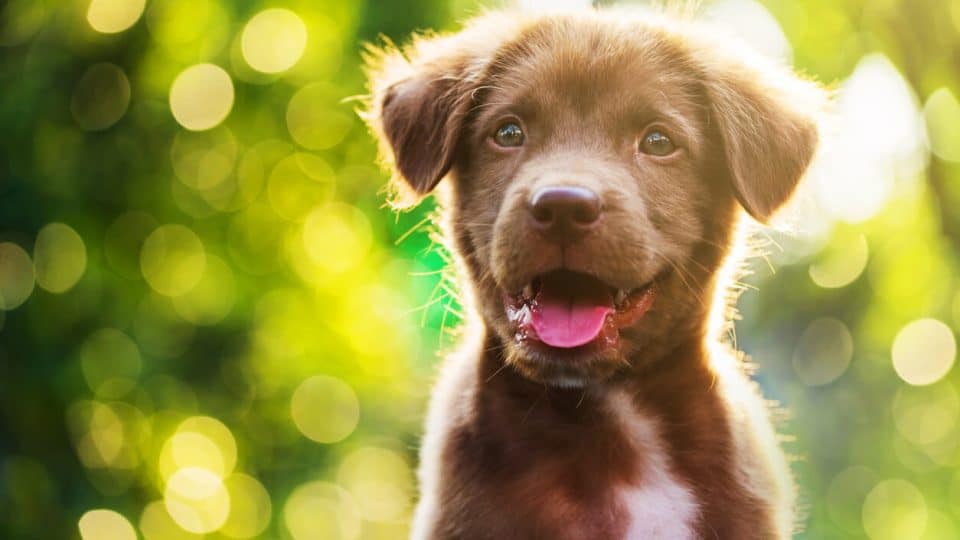When it comes to socialising your young puppy, you have a unique balancing act on your hands.
Puppies can’t go outside safely in public until they’ve completed their final round of vaccinations to protect from disease, according to Dr Sehaj Grewal, a veterinarian and CEO of The Melrose Vet. If you have a private garden that isn’t used by other dogs or animals, it should be safe to allow your puppy to use this when they arrive home. By this time they should have had their first set of vaccines (usually done at six weeks of age when they’re still with the breeder or rescue organisation). Then, it’s normally safe for them to explore the wider world from about seven days after they’ve received their final set of immunisations, once they’ve reached full effectiveness.
Of course, as you might have learned, the critical socialisation period of a dog’s life falls between roughly five and 14 weeks of age—before they’ve received all of their necessary vaccinations.
So how can you socialise your puppy while also keeping them safe from dangerous diseases? We’ll explain below, with advice from vets.
Which Vaccinations Do Puppies Need Before Going Out?
The core puppy vaccination schedule includes two (sometimes three) rounds of vaccinations, which protect against distemper, adenovirus, parvovirus, parainfluenza and leptospirosis. Optional vaccines include kennel cough and rabies (the latter is only relevant if you plan to take your puppy abroad, as the disease is not present in the UK). The first vaccine is normally administered between six and eight weeks of age, before they leave mum. The second jab is usually done between two and four weeks later, depending on the brand of vaccine and your pup’s age. If your chosen vet doesn’t stock the same brand of vaccine that your puppy was first injected with, the inoculation course may need to be restarted.
Following this schedule is crucial for your dog’s health. If you don’t follow the schedule, your puppy’s immunisations aren’t complete, which means they’re at risk of contracting infectious—and potentially fatal— diseases, according to Dr Grewal.
- Distemper. The distemper vaccine protects against the canine distemper virus. This fatal neurologic virus is usually transmitted through aerosol droplet secretions of animals infected with the virus.
- Adenovirus 1 and 2. The adenovirus vaccine protects against two strains of infectious canine hepatitis (ICH). This virus is transmitted to other dogs when they come into contact with the saliva, urine, or faeces of an infected dog.
- Parvovirus. The parvovirus vaccine protects against canine parvovirus (CPV), a highly contagious and often fatal intestinal virus. Parvo is transmitted through direct contact with the faeces of an infected animal.
- Leptospirosis. A life-threatening disease spread through the urine of infected animals. Also transmissible to humans, it can progress quickly and lead to organ failure.
- Parainfluenza. The parainfluenza vaccine protects against the canine parainfluenza virus (CPIV).

Kirill Gorshkov via iStock
When Can Puppies Go Outside?
It’s best to ask your vet about your puppy’s individual needs before you take them out. A vet can provide more personalised guidance on when your puppy can go outside based on their health, age, and vaccine status.
Exploring the garden
Puppies can typically venture into your garden when you bring them home—as long as it is fenced and not accessed by dogs or animals who could carry infectious diseases.
If you live in an apartment building, you will have to balance the advantages of early toilet training outside with the risks. Your vet can advise you on this. If there is a spot outside your building that isn’t highly trafficked by other dogs or near any type of animal faeces, toilet training outside might be recommended. If that’s the case, pick the same spot for your puppy to use until seven days after their completed vaccination course. Without a quiet, safe spot outside, you will want to stick with puppy training pads until your pet is fully protected.
Taking their first walk
Vets recommend keeping your puppy in your garden until they’ve completed their course of vaccines. But, if you’re able to keep them off the ground and away from contact with other dogs (with a carrier or puppy pram), it’s a good idea to start getting them used to the world outside your home and garden as early as possible.
Going on walks with your new puppy will inevitably bring them into contact with other dogs. As you don’t know the vaccine or disease status of these dogs, it’s best to wait until your puppy is fully vaccinated before taking them on walks unless paws are off the ground.
This will help lower the risk of them catching any life-threatening viruses, like parvovirus and distemper. These highly contagious viruses spread very easily through direct contact, Dr Grewal explains.
Visiting the dog park
A week after your puppy’s final round of vaccinations, they’ll have full protection from the worst of puppyhood diseases. Your puppy is now ready to say hello to unfamiliar dogs and explore the great outdoors.
When you do go to the park for the first time, Jennifer Abrams, an Associate Certified Applied Animal Behaviorist (ACAAB) with Behavior Vets in the USA, recommends always paying close attention to your puppy.
“If you have a puppy interacting with other dogs, it is especially important to make sure the puppy is having a good time,” Abrams says. “They may need help recognising who is a safe playmate and who is too rough.”
Important! Sometimes adult dogs can get upset with puppy behaviour, so it’s important to make sure your puppy learns to recognise and respect an older dog’s back-off signals, like growling.
Socialising Puppies Who Aren’t Fully Vaccinated
“Early socialisation is vital to set a puppy up to thrive in the world,” Abrams says. “It’s essential to understand that ‘socialisation’ isn’t just about exposure to new experiences—it’s about gentle, positive exposure.”
Before your puppy gets all their vaccines, you can begin to socialise them safely by introducing them to familiar, fully vaccinated dogs—as long as they’ve had their first round of vaccinations.
Ask your friends to bring their healthy, fully vaccinated dogs over to your place for puppy play dates. Just make sure to wait one week after your puppy has had their first round of shots!
You can also enroll your puppy in socialisation classes to encourage their social development. You’ll need to wait a week after their first round of vaccinations before they can attend the class.

EllenMoran via iStock
Keeping Puppies Entertained When They’re Stuck Inside
Dealing with a rambunctious puppy who’s eager to explore the world can be challenging, to say the least. However, before your puppy can go outside, you have plenty of options for keeping them mentally and physically stimulated indoors.
Try these ideas:
- Train them in different areas, from potty training to obedience training
- Teach them tricks
- Exercise them with hide-and-seek games. Try hiding yourself or treats!
- Play games like tug-rope or fetch
- Offer food puzzles for mental stimulation
- Set up a window space for a quieter form of stimulation
“It’s important to have a mix of interaction, active play, and quieter solitary play,” Abrams says. “As you get to know your puppy better, their play styles and preferences will become clearer, and that can help you decide which games are the most fun for you both.”


